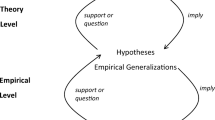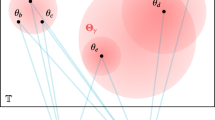Abstract
The problem of underdetermination is thought to hold important lessons for philosophy of science. Yet, as Kyle Stanford has recently argued, typical treatments of it offer only restatements of familiar philosophical problems. Following suggestions in Duhem and Sklar, Stanford calls for a New Induction from the history of science. It will provide proof, he thinks, of “the kind of underdetermination that the history of science reveals to be a distinctive and genuine threat to even our best scientific theories” (Stanford 2001, p. S12). This paper examines Stanford’s New Induction and argues that it – like the other forms of underdetermination that he criticizes – merely recapitulates familiar philosophical conundra.
Similar content being viewed by others
References
Boyd, Richard [N.]: 1982, ‘Scientific Realism and Naturalistic Epistemology’, PSA: Proceedings of the Biennial Meeting of the Philosophy of Science Association (1980) 2, 613–662.
Carl Hoefer Alexander Rosenberg (1994) ArticleTitle‘Empirical Equivalence, Underdetermination, and Systems of the World’ Philosophy of Science 61 592–607
Kitcher, Philip: 1993, The Advancement of Science, Oxford University Press.
André Kukla (1993) ArticleTitle‘Laudan, Leplin, Empirical Equivalence and Underdetermination’ Analysis 53 IssueID1 1–7
Larry Laudan Jarrett Leplin (1991) ArticleTitle‘Empirical Equivalence and Underdetermination’ The Journal of Philosophy 88 IssueID9 449–472
Peter Lewis (2001) ArticleTitle‘Why the Pessimistic Induction is a Fallacy’ Synthese 129 371–380 Occurrence Handle10.1023/A:1013139410613
P. D. Magnus (2003) Underdetermination and the Claims of Science University of California San Diego
Magnus, P. D. and Craig Callender: forthcoming, ‘Realist Ennui and the Base Rate Fallacy’.
Sklar, Lawrence: 1985a, ‘Do Unborn Hypotheses have Rights?’, in Philosophy & Spacetime Physics, University of California Press, Berkeley, pp. 148–166.
Sklar, Lawrence: 1985b, ‘Methodological Conservatism’, in Philosophy & Spacetime Physics, University of California Press, Berkeley, pp. 23–48.
Lawrence Sklar (1985c) Philosophy & Spacetime Physics University of California Press Berkeley
P. Kyle Stanford (2001) ArticleTitle‘Refusing the Devil’s Bargain: What Kind of Underdetermination Should We Take Seriously?’ Philosophy of Science 68 S1–S12 Occurrence Handle10.1086/392893
Author information
Authors and Affiliations
Corresponding author
Rights and permissions
About this article
Cite this article
Magnus, P.D. What’s New about the New Induction?. Synthese 148, 295–301 (2006). https://doi.org/10.1007/s11229-004-6223-5
Issue Date:
DOI: https://doi.org/10.1007/s11229-004-6223-5




